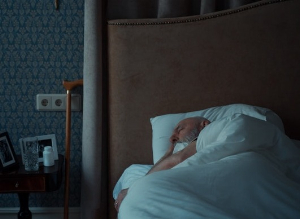Night sweats: What causes them?
Published 7 Feb 2022 • By Candice Salomé
Night sweats are characterised by excessive sweating at night during sleep. This symptom, which just as frequent in men as in women, can considerably alter one's quality of life. Indeed, waking up sweating, with soaked sheets and pyjamas, is not a pleasant experience. There are many causes, some of which are benign, while others require medical advice.
So what causes night sweats? When should you seek medical advice?
We tell you everything in our article!

What are night sweats?
Night sweats are episodes of sudden and excessive sweating during sleep. This sweating may occur once or several nights in a row. The excessive production of sweat is called "hyperhidrosis".
Night sweats are often associated with sleep disorders.
Generally, night sweats are the consequence of the stimulation of the sympathetic nervous system, which is one of the body's autonomic nervous systems. The origin of this sweating is the excitation of this nervous system.
There are many causes, however. It is therefore necessary to identify the precise origin of the problem to avoid any complications.
What can cause night sweats?
Before considering the pathological nature of night sweats, it is essential to rule out any environmental or situational causes such as stress, nighttime panic attacks and nightmares, a room that is too hot, a spicy or heavy meal, alcohol, clothing that is too warm to sleep in, or physical activity before bedtime.
Night sweats can also be a side effect of certain treatments (antipyretics, certain antidepressants, beta-blockers, etc.) or the result of nicotine or alcohol withdrawal, for example.
When none of these factors can explain the onset of excessive night sweating, it is recommended to seek medical advice. The doctor will look for physiological or pathological causes.
Night sweats can have several causes. For example, they can be linked to:
- Sleep apnoea
- Restless legs syndrome
- Gastroesophageal reflux disease (GERD)
- Acute or chronic infections such as tuberculosis, HIV, hepatitis C, endocarditis, fungal infections, etc.
- A hormonal imbalance such as during pregnancy or menopause, or hyperthyroidism
- Certain cancers such as Hodgkin or non-Hodgkin lymphoma
Given the many possible causes of night sweats, it can be difficult to establish a diagnosis. Several examinations are therefore necessary.
The cause of night sweats may, in some cases, be idiopathic, i.e. no clear cause can be established.
What are the consequences of night sweats?
Waking up suddenly in the middle of the night can have many consequences. Indeed, night sweats reduce sleep quality. The short-term consequences may include:
- Concentration and attention problems,
- Memory problems,
- Chronic fatigue and daytime sleepiness,
- Mood disorders,
- Increased sensitivity to pain.
In the long term, the consequences of chronic sleep deprivation are much more serious, as it may lead to:
- Excess weight and obesity
- Depression
- Decreased immune defenses
- Increased risk of cardiovascular diseases
- Increased risk of diabetes
- Premature ageing of the skin
If night sweats occur regularly and tend to last for several nights, it is important to seek medical advice. There exist different solutions to help you deal with this disorder.
What treatment options are available for night sweats?
In order to determine the cause of night sweats, a medical examination can be necessary. The doctor will first need to determine how long ago and in what circumstances the sweating started.
A physical examination and a blood test may also be necessary.
If the cause of the night sweats is not identified, an appointment with a specialist may be considered. Other examinations may be needed to enable a more in-depth diagnosis. For example, a sleep study may need to be carried out to identify sleep apnoea.
Depending on the diagnosis, an appropriate treatment can be prescribed, such as:
- Homeopathic treatments
- Relaxation exercises
- Psychological therapy
- Hormonal treatments
- Or even preventive measures, such as lifestyle and dietary changes.
In conclusion, if you experience frequent night sweats that are not directly linked to your lifestyle (warm temperatures, diet, physical activity, etc.), don't delay in consulting your GP before a chronic sleep disorder sets in and impacts your quality of life.
3 comments


 Facebook
Facebook Twitter
Twitter




